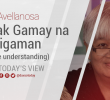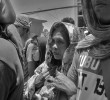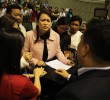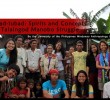By Carol Pagaduan-Araullo
Streetwise/Business World
Posted by Davao Today
Looking back through the last 26 years to the FQS of 1970, one harkens to a time of cerebral and physical ferment, a time of trepidation and courage, a time of study and education, a time for the heightening of political consciousness, a time to make crucial decisions affecting one’s life, going full-time into revolutionary work. – Antonio Zumel, Remembrances of the FQS of 1970, 1996
I wasn’t a direct participant in the historic First Quarter Storm (FQS) of 1970 – a series of protest mass actions, which began on January 25, 1970 and continued up to March of 1970. I wasn’t even attuned to its revolutionary slogans and its heart-racing, militant fervor. While already railing against social injustice and police brutality, I was not yet an “ND” or national democratic activist.
This January, commemorative activities on the 40th year of the FQS have begun. They are spearheaded by the FQS Movement, an organization of activists in the 70s dedicated to keeping alive the memory, significance and continuing relevance of that defining point in our nation’s history.
One could sense then that Philippine society was at the brink of social upheaval. Prices of basic commodities were rapidly rising in the wake of frequent oil price hikes. Graft and corruption in government was rampant, there were warlords and rival political clans in every province. Abroad, youth revolts and anti-war protests were rife. The Vietnam War was raging and the Great Proletarian Cultural Revolution in China had just passed.
The Marcos regime increasingly used the armed forces and the police to suppress protest and opposition as the streets resounded with the cries of tens of thousands of demonstrators denouncing the three social evils – US imperialism, feudalism and bureaucrat capitalism/fascism – and calling for a new national democratic revolution that would sweep away the decrepit ruling system and usher in an independent, egalitarian, just, peaceful and prosperous Philippine society.
The FQS ferment and upsurge in the democratic mass movement nationwide led to the heightened political education of hundreds of thousands of Filipinos especially the youth and the unpararelled expansion and consolidation of activist mass organizations. It was on this high tide of the national democratic movement that I found myself buoyed up leading to my own political awakening.
From a conscience-stricken, reform-minded but naïve student leader I became a true-blue ND activist, studying Marxist and other progressive writings, imbibing the mantra of “serve the people” and immersing myself in the lives and struggles of the oppressed and exploited, fellow Filipinos who, given my privileged socio-economic upbringing, I would likely have blithely overlooked or disregarded as I pursued my middle class dreams of success.
My first encounter with state fascism was at the barricades set up by students and striking jeepney drivers to protest oil price hikes and the related killing of a young activist. Marcos ordered the dreaded Metropolitan Command of the Philippine Constabulary to launch attacks on the University of the Philippines campus where the protesters had established a symbolic “Diliman Commune”.
I quickly learned how an unjust system is propped up by those who benefit the most from it utilizing the coercive powers of the state. Not only is it exceedingly just but necessary to defend oneself and assert one’s rights, with whatever means possible, against such state-sponsored violence.
Little by little, I learned more about Philippine society not only from discussion groups or “DGs” and rallies but also by undertaking practical investigation of prevailing social conditions and class divisions during community organizing work in sprawling slum settlements all over Metro Manila.
Martial law brought about a brief stint in the urban underground before I was arrested and detained for several months. Upon release from prison I entered medical school and in between arduous studies and 48- to72-hour hospital duty, I continued my activist involvement with the health sector, keenly aware that the ills of our indigent patients were the result not just of the ravages of disease but deeply-rooted social problems.
When the Marcos dictatorship fell during the EDSA 1 “people power” uprising and Corazon “Cory” Aquino assumed power, there was initial confusion in some sections of the movement regarding the character of her regime. In due time, it became starkly clear that only the formal trappings of democracy had been restored, Philippine society was basically unchanged, and in fact the socio-economic and cultural crisis was continuing and even worsening.
The Mendiola massacre of peasants plus the exemption of Hacienda Luisita from land reform, the grievous human rights violations when Mrs. Aquino “unsheathed the sword of war” against the CPP-NPA-NDF, and her about-face from her promise to remove US bases from Philippine soil – all these provided the rude awakening for those who had harbored illusions of more thoroughgoing and fundamental reforms under the US backed-Cory regime.
Going on from health sector activism to multisectoral issues and campaigns, I coordinated the Network Opposed to the Bataan Nuclear Power Plant (No to BNPP!). The BNPP scam was a clear example of the connivance between US monopoly capital and local bureaucrat capitalists to amass profits at the people’s expense and detriment. Along with the failure of the Presidential Commission on Good Governance to prosecute Marcos’ cronies, it also betrayed the Aquino regime’s inability to rectify the martial law regime’s anti-people practices, if not its continuing complicity with or acquiescence to graft and corruption in government.
These experiences deepened my understanding of the truth about an ailing society in deep crisis and no less than a revolutionary overhaul of that social system would suffice.
Clearly, the Philippine crisis continued under the Ramos and Estrada administrations reaching unprecedented proportions under the Arroyo regime. Its wanton plunder of the nation’s coffers, unabashed kowtowing to US and other foreign interests, feudal patronage of political clans and warlordism all the more underscore the urgency of the calls that reverberated during the FQS: Down with Imperialism, Feudalism and Bureaucrat Capitalism!
The 40th anniversary of the FQS is best commemorated by renewing the resolve to carry forward the struggle for nationalism and democracy to a higher stage as local and global conditions become even more favorable than 40 years ago. Filipino activists must seize the day, the hour to realize the calls that resounded far and wide during the First Quarter Storm. (Business World/Posted by Davao Today)

![[STANDPOINT] Illegal drugs and the NIMBY mindset](https://davaotoday.com/wp-content/uploads/2016/09/Mags-Maglana_UPMIN-Sept.-20-110x100.jpg)








